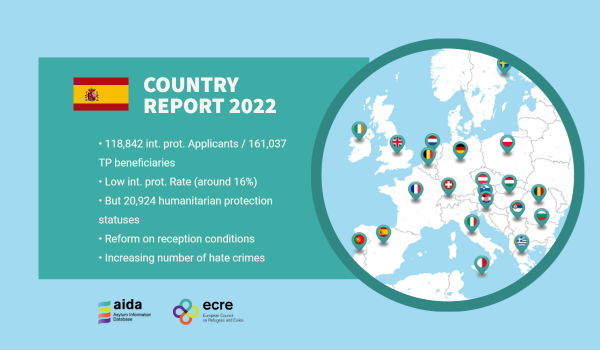The updated AIDA Country Report on Spain provides a detailed overview on legislative and practice-related developments in asylum procedures, reception conditions, detention of asylum seekers and content of international protection in 2022. Further, the report includes an annex providing an overview of temporary protection.
In 2022, 31,219 migrants arrived to Spain by land and sea, which represents a decrease of 25.6% compared to the 41,945 arrivals in 2021, mostly due to a drop in arrivals to mainland and the Canary Islands. Pushbacks practices continued in 2022. At the beginning of March, around 2,500 people attempted to access Melilla by jumping the fence, and almost 500 actually reached the enclave. Many organisations denounced the violence used by the police against migrants that attempted the jump, which resulted in about 20 people being hospitalised and 30 pushed-back. On 24 June, around 2,000 persons attempted the jump, resulting in 37 persons dead and hundreds injured. Different organisations expressed concerns regarding the use of indiscriminate violence in border management activities. In addition, various organisations, migrants’ groups, political parties, and institutions asked for an independent investigation to ascertain political accountability for the deaths occurred. Several death were reported also on the Mediterranean and Atlantic route, several figures have been reported.
A total of 118,842 people applied for international protection in Spain in 2022, almost half of which (45.96%) women. Venezuela, Colombia, Peru, Morocco and Honduras were the top five nationalities of applicants. Among them, 54.04% were men, while 45.96% were women. The recognition rate remained significantly low, with only around 16% of cases being recognised international protection. The overall recognition rate reached however more than 40%, if decisions granting humanitarian protection are taken into account. At the end of the year, 92,152 applications were still pending at first instance. Obtaining an appointment to register asylum applications was particularly challenging due to the long waiting times, to the point that UNHCR’s Representative defined the situation on access to asylum in Spain as “critical”. For what concerned temporary protection, 161,037 beneficiaries were registered in Spain until December 2022.
2022 was a year of important developments regarding reception of asylum seekers in Spain. In March 2022, after years in the waiting, the Spanish Government gave full transposition to the Reception Conditions Directive. In October 2022, the Government further announced that 215 million Euros of the National Recovery and Resilience Plan would be allocated to build 17 reception facilities for migrants and asylum seekers, with a capacity of 6,100 places. UNHCR supported the Ministry of Inclusion, Social Security and Migrations (MISSM) and NGOs managing reception centres for refugees and asylum seekers in the implementation of national standard operating procedures to prevent and respond to gender-based violence in the reception system, enhancing the reception personnel capacity to adequately detect, refer, and intervene in GBV cases with a survival-centre approach. Four separate centres (CREADE) were created to address reception needs of those displaced from Ukraine at the beginning of March 2022.
Despite some improvements, Discrimination and hate crimes against migrants and refugees continued to be a reason of concern in 2022, and unaccompanied migrant children and LGTBQI+ asylum seekers became a particular target. Asylum seekers, migrants and refugees continued to face challenges in accessing rights, especially housing, employment, and financial services, partially due to discriminatory practices. Following a visit carried out in Spain, the Council of Europe Commissioner for Human Rights called on the Government to improve the human rights of migrants and asylum seekers, especially in relation to accessing social rights, including housing and health care.
For further information:
- Find comparative information in the Asylum Information Database (AIDA) managed by ECRE

